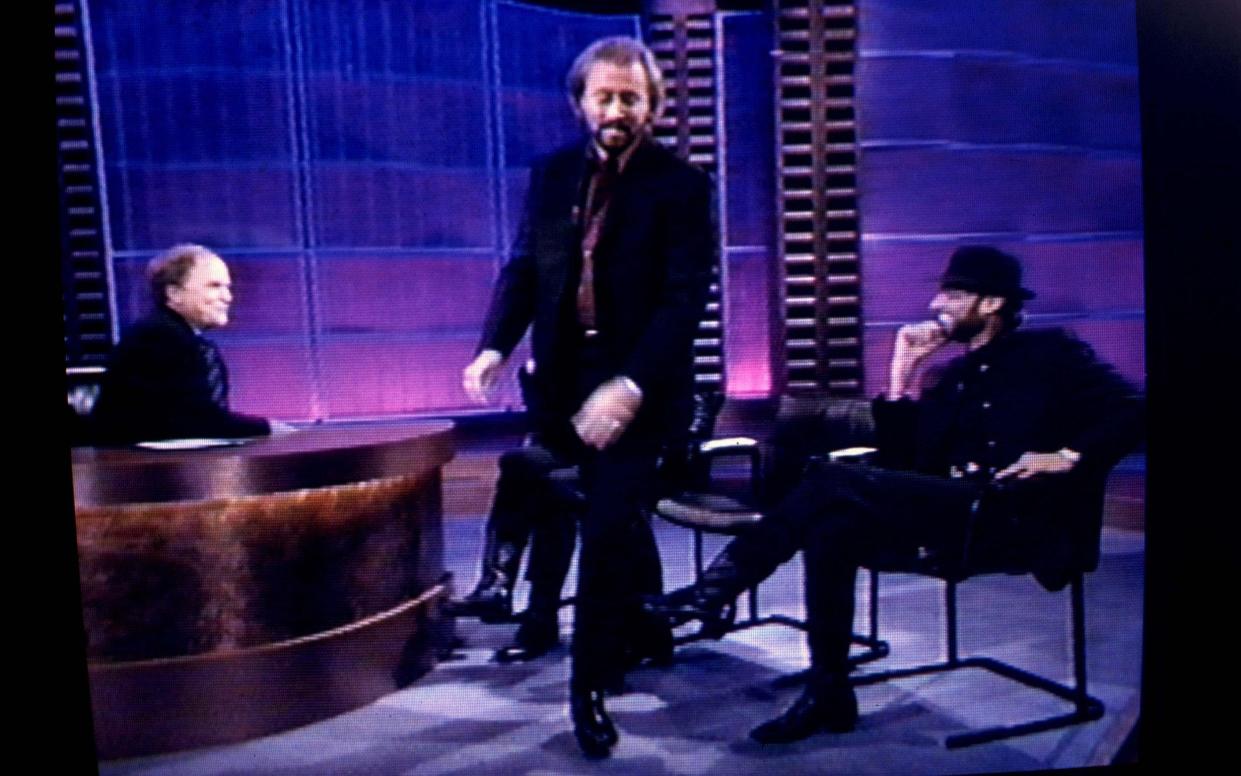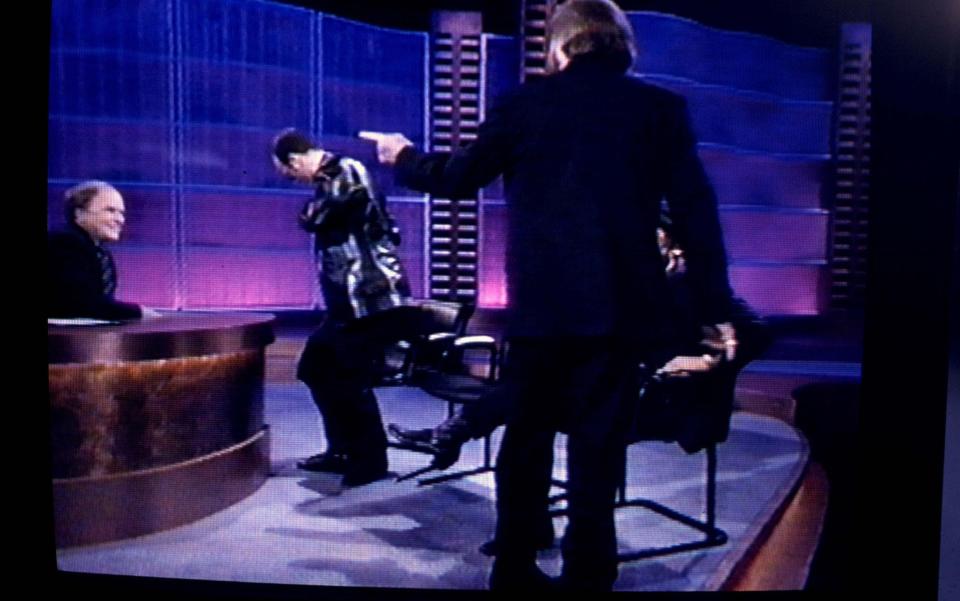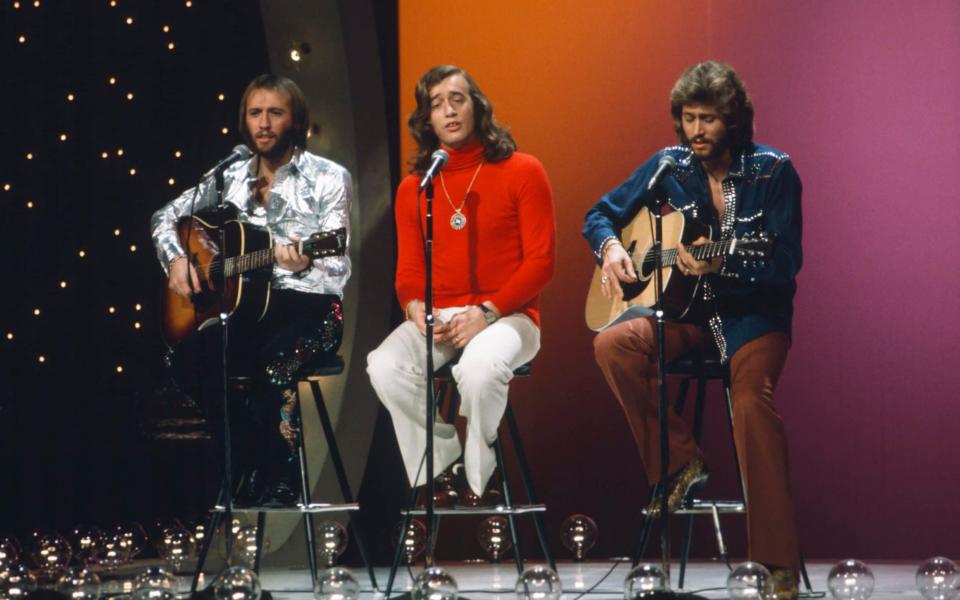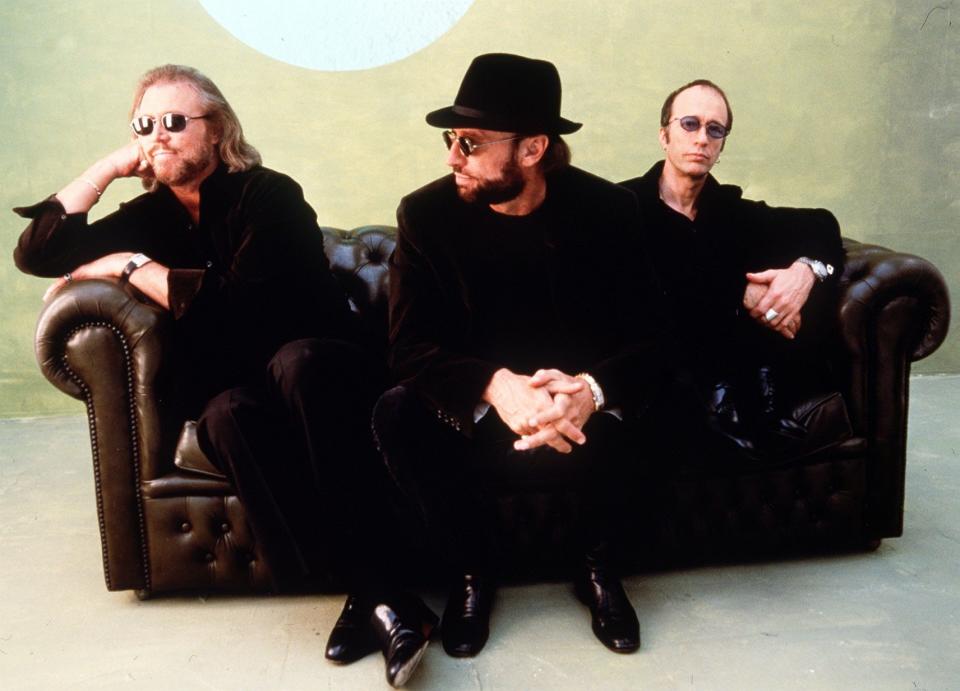‘A barrage of inferred insults’: what really happened when the Bee Gees met Clive Anderson

“You’re the tosser, pal.” Those four words – from the almighty Barry Gibb, no less – punctuated one of the Nineties’ most notorious TV events: The Bee Gees storming off Clive Anderson All Talk in October 1997. The walk-off came after nine minutes of seemingly innocuous ribbing at the Gibb brothers’ expense.
Elvis Costello, also in the studio that night, tried to talk The Bee Gees round, while Clive Anderson was met with an immediate phone call from a tabloid journalist. It was a headline story of the week; by 1999 the incident was being listed as one of the all-time great TV moments in end-of-the-century retrospectives.
Indeed, aside from some dodgy cover versions – Take That, N-Trance, Pras, and Steps – the incident might have been The Bee Gees’ biggest hit of that era.
Clive Anderson admits it’s the best remembered moment from his decade-plus of television chat shows. “I do get asked about it in interviews,” Anderson tells me (answering yet more questions about the Gibb brothers). “But if I meet people in the street that’s almost the first or second thing they say to me. ‘Still in touch with The Bee Gees?’”
At the time, the Brothers Gibb – Barry, Maurice, and Robin – were cast by popular consensus as naff relics, with their disco bangers yet to be reclaimed as works of genius, and their best-remembered image – the high-pitched voices, the medallions, the hair (or lack thereof) – an easy target for ridicule. The walk-off also reinforced a likely-unfair presumption about The Bee Gees: that they were spiky and humourless.
It’s still easy to overlook how fantastic The Bee Gees were. As detailed in a new HBO documentary, How Do You Mend a Broken Heart – which is broadcast on Sky Documentaries this Sunday and released on DVD the following day – they were masterful, complex, and eternally influential songwriters, and their careers marked by huge success, substance abuse, and – pun partially intended – tragedy.
In 1997, the brothers were promoting their Still Waters album and its title track. They later said they agreed to appear on Clive Anderson All Talk because they were told “he was a huge fan and he was gonna show the video”.
Clive Anderson explains that he liked to get the most out of his guests by injecting gags into his interviews, or framing questions as jokes. “The funnier they could be, the better,” he says about his guests. “It was higher energy and aimed more at comedy than most chat shows.”
He’d had previous prickly experiences with guests. Richard Branson, in what seemed to be a misjudged joke, once threw water over him (“I’m used to that,” quipped Anderson. “I’ve flown Virgin”). Anderson also had a testy interview with Jeffrey Archer (“The old jokes are the best ones,” said Archer. “Yes, I’ve read your books,” fired back Anderson).
“My way of interviewing was to put a bit of pressure on,” says Anderson. “You always want people to say something new or different or interesting. I was trying to get guests to come up with stuff in the moment, in the excitement of it. Sometimes it works, sometimes it doesn’t!”
The Bee Gees arrived as bonus guests at the end of a recording. Anderson had already filmed a previous week’s show, including an interview with Elvis Costello. There were some clued-in Bee Gees fans in the audience; for others, their appearance was a surprise.

The Bee Gees watched the Elvis Costello interview from the green room. “They were there in time to see the previous week’s show being recorded, which went quite well and was all friendly,” Anderson says. “That was part of the problem I think!”
In subsequent interviews, The Bee Gees slated Anderson for making snide gags from the start (“As soon as he opened his mouth,” Maurice later said). But watching it back now, Anderson looks almost in awe of them. They were naff relics, perhaps, but music megastars of 30 years by 1997.
“It was exciting for me and the audience to have The Bee Gees on as this big bonus at the end of the evening,” says Anderson. “That possibly contributed to the trouble. The audience and I were probably more hyped up than we would have been. At that point it was all going so well. Until the interview got going.”
Anderson’s jokes now feel lightweight – obvious even. He made cracks about their falsetto voices (“There have been some highs and lows. Well, mostly highs in your case”); poked fun at their songwriting process (“Does one do the words, another do the music, the other do the crossword?”); and put a platform-heeled boot into their Seventies clobber (“Sometimes you’re fashionable, usually you’re not”).
“I’m looking at it subjectively,” Anderson says now. “But if they hadn’t walked out I don’t think people would remember it in any way as a particularly weird or strongly-worded interview.”
Barry Gibb disagreed. “It was just a barrage of inferred insults,” he told The Sun in 2016. But it does seem like Barry was – at first, at least – enjoying the banter. When asking about where the high voices came from, Anderson said: “Were you working with Mickey Mouse at the time?” “No, he got his voice from me,” joked Barry.

A chink seems to appear in Barry’s playful veneer at the moment Anderson takes a dig at their songs. “You're hit writers, aren't you? I think that's the word, anyway… we're one letter shy,” said Anderson. “I’m glad you all find it amusing,” Barry told the audience.
Maurice later said about the interview: “We don't mind being ripped apart, but don't rip the songs apart… ‘cause they're like our kids.”
But Anderson tried to be complimentary about their earlier, pre-disco ballads, namechecking Massachusetts and Words. “They’ve written some fantastic songs,” Anderson tells me. “From the age of about 17, they were singing songs to match anybody, really.” As the story goes, it was a gag about their former band name, ‘Les Tosseurs’ which forced Barry to storm off. “You’ll always be Les Tosseurs to me,” joked Anderson.
It was Barry who first brought up the name. “I’m sure there are other bits I’m guilty of, but in that particular moment, Barry appeared to make the joke,” recalls Anderson. “I didn’t know they were called Les Tosseurs! It was news to me. It seemed to be a joke he was making. My natural inclination was to join in on the joke. I thought it was one of those jokes that fell beautifully. It was the sort of to-and-fro, cut-and-thrust you might do in conversation with your mates.”
Barry later denied that the joke alone upset him. “People think it was the last thing he said – the remark about tossers – that made us walk off,” Barry told Mojo Magazine. “It wasn't. It was the very first thing. We gave him a few more minutes out of professionalism.”

But watching the interview back, there is a definite shift in Barry’s body language as the comment lingers in the air. Barry seems to stew in the insult, drumming his fingers on the chair and irritably stroking his Bee Gee beard.
“The crucial thing is there were three of them,” says Anderson. “When you’re doing a one-on-one interview, you concentrate on each other. If there’s three of them, once you’re now talking to Guest B, Guest A is thinking ‘What did he just say?!’ I think that was one of the technical reasons it might have gone wrong.”
In the moment, Anderson had no idea the mood was souring. “I don’t think I did get much of a sense of that,” he says. “That’s where I went wrong. I’ve done reasonably tough interviews over the years. Not many but some. In those, I know that I’m asking difficult stuff. With The Bee Gees, in my naivety, I thought I was doing what I did with a lot of guests – treating them like old friends. I thought we were all joshing around. But along the way I was accidentally stepping on every awkward toe in their body. Not deliberately, but I managed to get there at every point.”
They walked off after the tamest gag of all. Barry referenced their 1969 No. 2 hit Don’t Forget to Remember, to which Anderson replied: “I’ve forgotten that one.” “I thought you might,” said Barry. “We’re getting on like a storm, aren’t we Clive? In fact, I might just leave.”
After calling Anderson a “tosser”, Barry called back “This is a set-up!”
“We could see our fans in the audience,” Maurice later told Mojo. “And they were stunned, like, 'How can they sit here and take that?' Before I knew it, Barry was up, and I could feel the heat from his body. He was really angry.”

Robin would sharply follow, leaving Maurice alone. Watched now, there's a moment of nerve-grating awkwardness as Maurice is obliged to follow but can’t get his radio mic off. The TV camera lays Anderson’s reaction bare. At first he thinks they’re joking, but his face sinks as he realises they actually are leaving. “It was a surprise and a shock to me, certainly,” Anderson says. “And off they went.”
“We were fans of Clive Anderson so that made me sad,” Barry told The Sun. “I just snapped.”
Elvis Costello tried to smooth things over. “Once they walked off he did his level best to persuade them not to leave. Elvis tried to speak with them to say, ‘He was only mucking around, don’t leave it like that!’ But they weren’t persuadable.”
Costello even offered to come back onstage and do some extra interview time. Anderson still has no idea how quickly the press picked up the story. By the time he’d left the studio and walked to the next-door office there was a call for him.
“It was a reporter – from The Star or The Sun, rather than The Telegraph – saying, ‘We hear The Bee Gees walked off your chat show,’” recalls Anderson. “Whether there were Fleet Street reporters posted in every studio audience in case something happened, or if someone from the audience phoned up the paper…? I don’t think it was The Bee Gees. They didn’t want the show even broadcast.”
The headlines hyped up the interview, which was broadcast on October 30, 1997 completely unedited. (“For two reasons,” explains Anderson. “One – there wasn’t much to edit! But two – we didn’t want anybody to say, ‘I bet he said even worse stuff to them!’”) There was a discussion within the BBC about not broadcasting it at all. “I’m don’t know how deep it went but there certainly was a discussion,” says Anderson. “I can remember saying, ‘Come on, we’ve got to broadcast it! It’s no good being a front page story and not broadcasting it.’”
Now it sits in the canon of classic Nineties, can’t-look-away-TV moments. “I felt bad. You don’t want to drive your guests away,” says Anderson. I wasn’t intending to be nasty to them. I accidentally annoyed three talented brothers. I wished it hadn’t happened but on the other hand it’s the thing that’s most memorable. I think that’s true of most chat shows – you only remember things that go wrong. They become real moments.”
That The Bee Gees would take themselves so seriously feels like an amusing disconnect. In the heyday of their Night Fever years – as the public consciousness tends to remember them – they were brilliantly ludicrous. Exactly what you want from classic pop stars.
There are other examples of po-faced appearances. In December 2002, Robin Gibb appeared on Vic and Bob’s Shooting Stars and insisted they play his new song. Vic and Bob had to stop the wackiness to play a simpering ballad. It's an excruciating moment of awkwardness and not cottoning onto the comedy vibe.
As Anderson says, opinion was divided over the interview. He says: “Either people thought, ‘They had a lack of sense of humour, given the show they were coming on,’ or, ‘What a ghastly person that Clive Anderson is, to be so rude to such talented people.” But The Bee Gees' personas certainly took a walloping over the years. “Maybe they’ve come in for their share of unfair stick,” says Anderson.
The Hee Bee Gee Bees – Angus Deayton, Michael Fenton Stevens, and Philip Pope (below) – made a mini music career out of parodying the Gibb brothers in the early Eighties:
In 2000, Matt Lucas and David Walliams parodied them in Rock Profile, with Walliams playing Barry as an all-powerful human-lion hybrid.
But The Bee Gees insist they could laugh at themselves. In a radio interview, Maurice recalled a story about how they stuck a sign on their Brits dressing room door which read “Les Tosseurs as Seen On Father Ted” (Maurice apparently loved Father Ted so much he was buried with a book of the scripts). Barry also made a self-lampooning cameo in the Only Fools and Horses special 'Miami Twice'. “Alright, Bazza!” shouted Del Boy, before singing How Deep Is Your Love at him.
Clive Anderson recalls he was offered a chance at reconciliation the following year. Producers of An Audience with The Bee Gees asked him to appear in the audience and ask a question. Anderson couldn’t make the show and thinks it might have been the wrong move.
“Some people say I was dreadful, other people say they had no sense of humour, but there’s another group of people who say, ‘Oh, it was just staged!’” says Anderson. “If you saw me popping up from this audience saying, ‘Oh, Barry, remember me?’ that might reinforce the notion that the whole thing had been a creation of the media, at the expense of the audience. I wouldn’t have minded making friends with them, but that would have been a bit weird.”
Anderson's one-man show, Me, Macbeth & I was put on hiatus this year due to Covid, but he also hosts Radio 4 shows Loose Ends and Unreliable Evidence. “I’m still interviewing people but I’m doing it on the radio,” he says. “I’m probably less focused on making sure every moment is funny. There’s a bit more room to breathe, maybe.”
Almost 25 years later, he hasn't been put off The Bee Gees. “It turned them against me, but it hasn’t turned me against them!” he laughs. “But I prefer their early stuff.”
Watch: The Bee Gees: How Can You Mend a Broken Heart is on Sky Documentaries 13 December 13 and on DVD December 14


